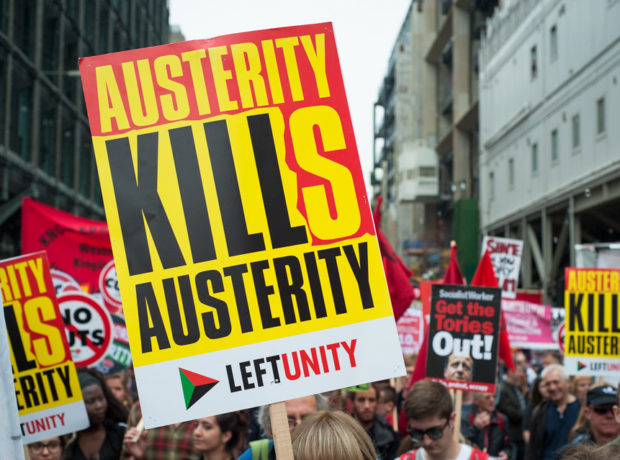The Online Activist
One Sunday this summer ‘Jean’ (not her real name) had taken enough. She had worked for a Job Centre in the North East of England for several years but had become disillusioned by the ‘harsh environment’ which she felt was designed to ‘trip up’ job seekers and by the pressure on staff to sanction people for the smallest mistake.
She resigned from her job and along with two colleagues set up a website which aims to help job seekers challenge sanctions and unreasonable demands placed on them by the job centre.
With little fanfare the site went live in June and started dealing with a steady stream of inquiries. But as more and more people started to link to the site on social media, demands on the site exploded, leading to over 60,000 visitors and national press coverage . The three women provide help and advice in individual cases as well as promoting a series of model letters to challenge unreasonable job centre instructions and appeal against sanction decisions. They use social media to promote their successes and encourage others to appeal.
Jean and her colleagues are part of a growing number of activists who are using social media to challenge dominant narratives on austerity. These dominant narratives are based around a division between ‘strivers’ -the ‘hard working families’ who fund the welfare state, and ‘scroungers’ – those who receive benefits but put little back into society. This division is repeatedly emphasised by Government ministers and large sections of the press.
Challenging Dominant Narratives
In a speech in January this year, Secretary of State for Work and Pensions, Iain Duncan Smith, said that middle class families watching the Channel 4 programme, Benefits Street, had been shocked by the reality of the ‘twilight world’ of Britain’s welfare ‘ghettos’.
The claim that programmes like Benefits Street represent the reality of generations on welfare benefits with little desire to look for work is reinforced by a steady stream of newspaper articles, which focus on individual cases of benefit fraud, or of families who appear to be receiving large amounts of benefit payments. Not surprisingly, public attitudes to benefits have hardened – a poll carried out for the TUC in 2013 showed that 59% of people questioned, thought benefits had created a culture of dependency. The majority of people vastly over-estimated the amount of benefit fraud that was taking place.
The TUC and anti-poverty campaigners have attempted to tackle this narrative. For example they have pointed out that the average person imagines 27% of the welfare budget being lost to benefit fraud. Government’s figures show that it is actually 0.7%. While people think that 41% of the entire welfare budget goes on benefits to unemployed people, the true figure is 3%.
the strivers and scroungers narrative has proved stubbornly resistant to statistical evidence.
However, the strivers and scroungers narrative has proved stubbornly resistant to statistical evidence. Analysis of the British Social Attitudes Survey by NatCen Social Research found that 35% of people thought that people on benefits ‘don’t really deserve any help’, 37% thought most people on benefits are ‘fiddling’ and 54% thought that if benefits were less generous, people would ‘stand on their own two feet’.
One of the main challenges to this dominant narrative has come from social media and blogging, which has created a space for the voices of those living on benefits to be heard directly, rather than mediated by the mainstream media. Social media has served a dual function of increasing awareness of the real cost of welfare reform, and providing a counterpoint to misinformation and common myths that can pervade mainstream media sources.
Some blogs have been set up by established campaigning organisations in order to provide a voice to people claiming benefits. For example, Who Benefits? is a campaign that aims to share real stories from people who have received or are receiving benefits. False Economy, set up by the TUC, acts as a hub to share information, reports and personal testimony about public spending cuts and welfare reform.
Other blogs have been set up by individuals and combine personal accounts and campaigning. Sue Marsh blogs at Diary of a Benefit Scrounger about her own experiences of disability and claiming benefits, alongside sharing the experiences of others and campaigning against cuts to disability benefits. Her choice of title for her Blog, like that of Kaliya Franklin who blogs at Benefit Scrounging Scum, confronts the use of the term scrounger head on. These are two bloggers among many who have become experts on the workings of the benefit system; able to provide first-hand experience of what life is like on benefits as well as extremely detailed analysis of benefits policy and practice.
The mixture of personal testimony and detailed analysis makes for a powerful combination.
The mixture of personal testimony and detailed analysis makes for a powerful combination. It provides not only a human response to the narrative of ‘scroungers’ but also the sort of detailed challenge to claims from Government which is lacking in much of the mainstream media. On the Where is the Benefit blog, claims from the DWP that over a million people claiming Employment and Support Allowance have been found fit for work are picked apart with data showing how many of these people will have been wrongly assessed, how many will have had short term health problems and how many will have been obliged by the benefits system to claim Employment Support Allowance if they have lost their job for reasons of ill health
These voices have made positive contributions to the welfare debate, and in some cases have helped to shape and influence it. Disabled people have been particularly prominent in on line activism, using the internet to organise responses to policy proposals as well as campaign. Detailed analysis in blogs and reports has been backed up by twitter campaigns, which have helped bring the voices of bloggers to a much wider public.
For instance, the WOW campaign calls for a cumulative impact assessment of welfare reform on sick and disabled people. They succeeded in collecting enough signatures through on line activism to trigger a parliamentary debate on February 27th.The debate itself was covered in detail by bloggers and on twitter and the motion to carry out a cumulative impact assessment was carried.
Debates around the bedroom tax provide another example. This is one of the few areas of welfare reform where the Labour party has spoken out against the Government. This followed several years of warnings of the likely impact and then first-hand accounts of the actual impact by online bloggers. As print and broadcast journalists become aware of the importance of online voices as a source of information and analysis, some of these voices have been able to move to national media outlets, such as Jack Monroe at the Guardian.
Silencing of new voices
The new voices have not always been welcomed. Both Sue Marsh and Kaliya Franklyn have blogged about their experience of being asked to take part in television debates only to be stood down at the last minute, or have items cancelled because of the refusal of the Department of Work and Pensions to provide someone to oppose them.
Activists have been faced with online abuse alongside attempts to vilify them in the mainstream media. For instance, benefit claimants who do not fit into a narrow view of how they should act face a backlash: Jack Monroe has already been subjected to a Daily Mail smear campaign.
When she moved away from her role as a single mother living on benefits’ and began to write for the Guardian the attacks against her began. Appearing in an advertising campaign by Sainsbury’s increased the vitriol aimed against her.’ She was criticised by Richard Littlejohn both for her tattoos (‘she may have had more money for food and heating if she hadn’t spent so much on tattoos’) and for her use of kale in a recipe (‘a typical Guardianista’s idea of what ‘ordinary people’ should eat). She was used, in the same article as an example of the ‘spendthrift’ poor, (living in poverty because of her own poor lifestyle choices and her decisions to spend money on frivolities) and as being too middle class to understand the real experiences of ordinary people.
While social media has provided a forum for the vilification of campaigners, it has also offered new opportunities to challenge this sort of smear tactic in the press. Jack Monroe’s response to the Richard Littlejohn article, and more recently to comments by Edwina Currie, were reproduced in full in the Guardian and Daily Mirror respectively and were widely circulated via twitter and Facebook. Jack Monroe, Sue Marsh and Kaliya Franklyn have all provided strong alternative narratives to dominant ‘debates’ which often serve to silence or distort the voices of those most affected by austerity.
The Power of Twitter
Benefits Street was widely criticised for tapping into the ‘scrounger’ narrative and for attempting to create public controversy. Programme makers have become aware of the idea of a TV event and have become keen to promote discussion on sites such as Twitter, for example by flashing the hashtag #benefitsstreet on screen during especially divisive moments.
The ability to respond immediately means that topics that prove controversial can snowball and negative comments can escalate quickly. Many of the comments using the #benefitsstreet hashtag were extremely unpleasant and included death threats made against those appearing in the programme.
An analysis of tweets about the programme showed that while there were many negative comments, the largest group of tweets (13.8% of the total) were attempting to provide a ‘balancing narrative’ with statistical information about actual numbers on benefits, levels of fraud and so on, and the second largest group (9.7%) offering criticism of the programme makers and their agenda.
Unlike discussions on Facebook or blogs which might be assumed to be preaching to the converted, Twitter offers an opportunity for a huge variety of different voices to be heard, particularly for those following comments using a particular hashtag. Sue Marsh’s post reporting that she had been declared ineligible for Disability Living Allowance went viral on twitter. The hashtag #spartacusreport was used to promote a critical review of the Government’s proposals for changes to DLA and the failures of consultation around these proposals. It was one of the top hashtags trending in January 2012 and was even used by the DWP when responding to criticism.
While the dominant narrative in much of the mainstream media continues to support the division of society into scroungers and strivers, online forums and social media, fuelled by publicity on twitter, do provide an alternative. Increasingly powerful they run the risk of becoming part of the mainstream, an ironic twist on the story to date.
Photo by swirlingthoughts
Blogs:
False Economy / Gingerbread / Benefit Scrounging Scum / Where’s The Benefit / A Girl Called Jack / Birmingham Against The Cuts / Diary of a Benefit Scrounger / We Are spartacus / Spartacus Stories / Diary of a Goldfish / Disability Now / Carer watch / Ripped Off Britons / The Disability Book / Rage Against The Coalition / Disability Voices / Arbitrary Constant
Campaign sites:
Who Benefits? / DPAC / Disabled People Protest / The Hardest Hit / The Broken of Britain / Action for ESOL / We Will Be Heard / Job Seekers Sanction Advice



